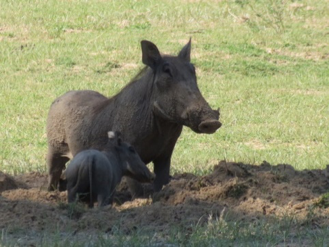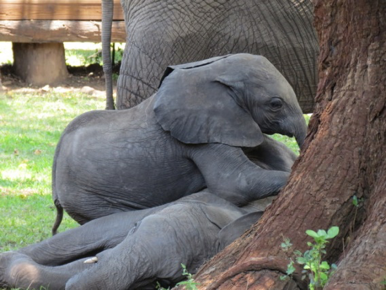Elephant extinction is a big topic. Here are ways to help.
Read MoreDo you have questions about the ivory stockpiles that Kenya burned recently? Many think the ivory should have been sold and the money given to anti-poaching or other worthwhile efforts
Read MoreThe South Luangwa National Park is nearly two and a half million acres of grasslands, riverine and riparian woodlands, rivers, lagoons, and semi-aquatic grasslands surrounded by bush in a country of one hundred and forty-eight million acres with mopane, mahogany, leadwood, winterthorn, sausage trees, vegetable ivory palms, marula, tamarind trees, and more.
Read MoreMfuwe has a police department and a local clinic which is usually staffed by doctors who come for short periods and are hired by the safari industry. There is one gasoline station and one occasionally working ATM machine where a small herd of goats seems to like hanging around.
Read MoreMfuwe (pronounced “muh” foo we) village has grown because of the many safari lodges in the area. People flock there seeking jobs, but there are more people than there are jobs in the safari industry which shuts down during the rainy season December through March.
Read MoreThe connection between ivory and terrorism continues to include many terrorist groups. Boko Haram, a branch of the Islamic State of Iraq active in the north of Nigeria since 2009, (The name means “non-Islamic education is a sin.”) wants to impose Islamic law as the only law in Nigeria, and is also among the militants making money from trafficking ivory tusks from slaughtered elephants to pay their fighters and buy arms and ammunition.
Read MoreMany ivory traders are terrorists. Money from buying and selling poached ivory finances their campaigns of terror and destruction. Between 2012 and 2014, about 60,000 elephants and more than 1,600 rhinos were slaughtered by poachers according to the Wildlife Conservation Society, the International Union for Conservation of Nature, and other organizations who work to protect endangered species.
Read MoreWhen an elephant dies, her calves, sisters, cousins, aunts, and grandmothers visit her body, using their trunks to examine every inch of her and touch her gently. They stay with her body for about three days. Part of this time they stand with their backs to her and occasionally touch her with a hind leg
Read MoreI love these guys. For all their fierce tusks, and annoyed looks on their faces, they are not aggressive to humans. Warthogs eat grass, fruit, berries, roots, and insects. When they are desperate depending on weather conditions, they also eat small mammals, birds, and reptiles and can live for months without water.
Read MoreDoes a photograph of an adorable baby elephant pull at your heart? These little guys were in the back courtyard at Mfuwe Lodge while their elders ate mangoes. They got tired, and one fell asleep. Like a true sibling or cousin, the other wouldn’t rest until he had what looked like the best napping spot.
Read MoreExcited villagers came to tell Rachel of Conservation South Luangwa that a hippo had fallen down a large deep hole where someone was going to put in a tank and was unable to get out. From the frenzy, Carol could not tell if they were rooting for the hippo to free itself or wanted it to fail so they could kill it and chop it up for dinner. Crowds of local people surround the well chanting and yelling and throwing things down on the hippo. Rachel thought they should probably put it down so it wouldn’t suffer.
Read MoreIn 2015 the Zambia Wildlife Authority (ZAWA) which is now called the Department of National Parks and Wildlife (DNPW) in Zambia, commissioned an aerial survey of wildlife. Funding was provided by Vulcan Incorporation as part of the Great Elephant Census, a Paul G. Allen Family Foundation project.
Read MoreThis leopard is just waking up from his afternoon nap. The sun is beginning to set, and he’s thinking about supper. Leopards tend to hunt alone. This guy is in a dry gully. Sitting above him in our Land Rover, we can snap tons of photos of him at just about every angle from his pink tongue to his rosettes of black that help distinguish him from a cheetah.
Read More












